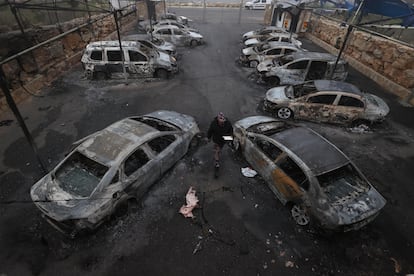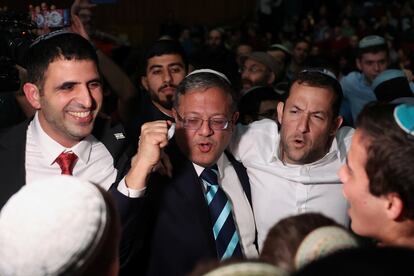International action against Israeli settlers who commit violence in the West Bank grows
The sanctions announced by the US, Canada, the UK, France, Spain and New Zealand represent an element of pressure on the Israeli government, which supports the movement

In the face of the support received by Jewish settlers from the government and the army, more and more international governments are ordering economic sanctions and travel restrictions against those who carry out attacks against Palestinians. Since the war began last October, more than twice as many violent acts have been recorded in the West Bank, according to the United Nations, where at least 400 Palestinians have been killed in attacks by the army or by settlers, Israeli citizens forcibly and illegally installed in Palestinian territory. On February 1, the United States opened the tap of sanctions and Canada, the United Kingdom, France, Spain, and New Zealand followed in the wake of this unprecedented measure.
So far, only the U.S. and British authorities have taken the step of identifying the persons against whom they have taken action, four in each case. There is only one Israeli citizen who appears on both lists made public: Yinon Levi, 31, who runs a farm in the illegal settlement of Meitarim, in the south of the occupied West Bank. In addition to travel restrictions, Levi’s personal and business bank accounts have been frozen by Israel.
The settlers and their lawyers blame these sanctions, in large part, on the work and denunciations of Israeli human rights organizations, such as B’Tselem and Peace Now, which for years have been closely following the abuses committed by Israeli settlers in Palestine, who number around 500,000. They often warn of the impunity with which they act under the protective shadow of the army, as in the case of Levi himself. In contrast to the other three people sanctioned by the U.S., local media describes him as a businessman who uses the Israeli authorities to consolidate a company with which to deepen the occupation of Palestine and expel the local inhabitants.
Mauricio Lapchik, director of external relations for Peace Now, considers the announcement by Spain that is also preparing a list of 12 settlers to be sanctioned as “an important step in the defense of the Palestinian population in the West Bank.” “However, it is still worrying that the Israeli government is not taking minimal steps to stop this phenomenon of organized violence that aims at annexing the occupied territories and clearly constitutes terrorism,” he adds. Israeli human rights organizations are working in the face of the most ultra-right-wing government in the history of Israel, in which the National Security portfolio is in the hands of a settler with an ultra-nationalist and racist discourse, Itamar Ben-Gvir.
Lapchik points to what he considers the triumvirate of government support for the settlers. In addition to Ben-Gvir, he cites Prime Minister Benjamin Netanyahu and Finance Minister Bezalel Smotrich. “We expect the Israeli government to take concrete steps to enforce the law in cases of settler violence. It is our hope that, in the future, it will not be necessary for other countries to impose sanctions on our fellow citizens for their criminal acts.”
Without naming any of these human rights groups, Levi blames the punishments imposed on him by the U.S. and the U.K. on “anarchist and leftist organizations” that defend the Palestinians and do “harm” to Israel, the settlements, the army and “everyone,” according to his statements, sent to EL PAÍS via voicemail. “From the moment we occupied the land, people from these organizations came to bother us,” he adds, referring to territory that the settlers consider public.

Fundraising
As soon as the sanctions were announced in February, other settlers and supporters of the movement launched campaigns to raise funds to address the economic suffocation of Levi’s farm. “I don’t accept handouts from other people,” he responds when asked about it. “I don’t want to feed my children with other people’s money. The money I receive is neither for me nor for my family, but to maintain the land and strengthen the land of Israel.”
According to the U.S. government, Levi led a group of settlers who “assaulted Palestinian and Bedouin civilians, threatened them with further violence if they did not leave their homes, burned their fields, and destroyed their property.” The British government’s accusation is similar.
Some 300 Palestinians have been evicted in recent months from their homes around Levi’s farm, according to Peace Now. On October 16, at the outset of the current war, in the presence of Israeli soldiers, Levi drove a bulldozer into the village of Susiya, near Meitarim, where he carried out destruction, according to the Israeli press. Despite being well known as a violent settler, he has never been prosecuted, unlike other settlers targeted by the U.S. and the U.K.
Peace Now denounces, moreover, that the Har Hevron Regional Council (the Israeli occupation authority that manages the colonies in the area) signed a contract with Levi in 2021 for the construction of his agricultural farm, which is, according to the NGO, evidence of a direct link between him and the authorities. “There is a good chance, if the U.S. continues to sanction violent settlers, that the regional council could also be sanctioned for the contract it signed with Levi,” notes Lapchik.
The Honenu Association, the legal aid organization for the settlers, represents those who have been sanctioned. Its lawyers are trying to prevent the freezing of accounts at Israeli banks from going ahead. Its director, Shmuel Meidad, who calls the targeted settlers “heroic,” welcomed the fact that the courts initially ruled in their favor, according to a February 15 statement from the organization. “No foreign country, let alone a so-called ‘friend’ of Israel [referring to the United States], should be able to impose a policy on the sovereign state of Israel, certainly not on the backs of the best of its children, who are sacrificing their lives for sovereignty,” Meidad said. Days later, the fundraising campaigns were blocked following an Associated Press investigation cited by Israeli media.
The U.S. sanctions system and its involvement beyond its borders is very strict, according to an analysis by Amichai Cohen of the Israel Democracy Institute think tank. Their impact “can significantly damage the economy of that country as a whole,” he says in reference to Israel. Cohen notes that “President [Joe] Biden authorizes the Secretaries of State and Treasury to impose sanctions on anyone who endangers stability in the West Bank, and anyone who acts violently to harm people or their property, or to deprive them of their property. The order also applies to organizations — including governmental organizations — that support such actions.”
Compared to the U.S., “the sanctions regime of the EU or other Western countries is quite limited,” Cohen adds, as they focus on “activities carried out within the borders of the sanctioning country and assets located in that country.”
The sanctions have both angered and caused concern within the settler movement. “It’s unbelievable. We are not talking about terrorists. It’s not money that is dedicated to causing terror. We are talking about people and private initiatives” who “are fighting for their home, for our land,” says Itamar David Moshe, a 35-year-old lawyer and military reservist who lives in a West Bank settlement. He believes that the sanctioning countries are acting without evidence and illegally, which is why he plans to direct all his “expertise and knowledge, at no cost” to address these punishments. “They exceed a red line that we cannot accept,” he adds. “These sanctions can hurt us in the short term. Without even a trial, the United States wants to regulate our country, regulate our society, regulate our people [...] I don’t think this is a matter for the United States, to take their money and freeze their accounts. I hope that the Supreme Court of Israel will stop this madness.”
Sign up for our weekly newsletter to get more English-language news coverage from EL PAÍS USA Edition
Tu suscripción se está usando en otro dispositivo
¿Quieres añadir otro usuario a tu suscripción?
Si continúas leyendo en este dispositivo, no se podrá leer en el otro.
FlechaTu suscripción se está usando en otro dispositivo y solo puedes acceder a EL PAÍS desde un dispositivo a la vez.
Si quieres compartir tu cuenta, cambia tu suscripción a la modalidad Premium, así podrás añadir otro usuario. Cada uno accederá con su propia cuenta de email, lo que os permitirá personalizar vuestra experiencia en EL PAÍS.
¿Tienes una suscripción de empresa? Accede aquí para contratar más cuentas.
En el caso de no saber quién está usando tu cuenta, te recomendamos cambiar tu contraseña aquí.
Si decides continuar compartiendo tu cuenta, este mensaje se mostrará en tu dispositivo y en el de la otra persona que está usando tu cuenta de forma indefinida, afectando a tu experiencia de lectura. Puedes consultar aquí los términos y condiciones de la suscripción digital.









































